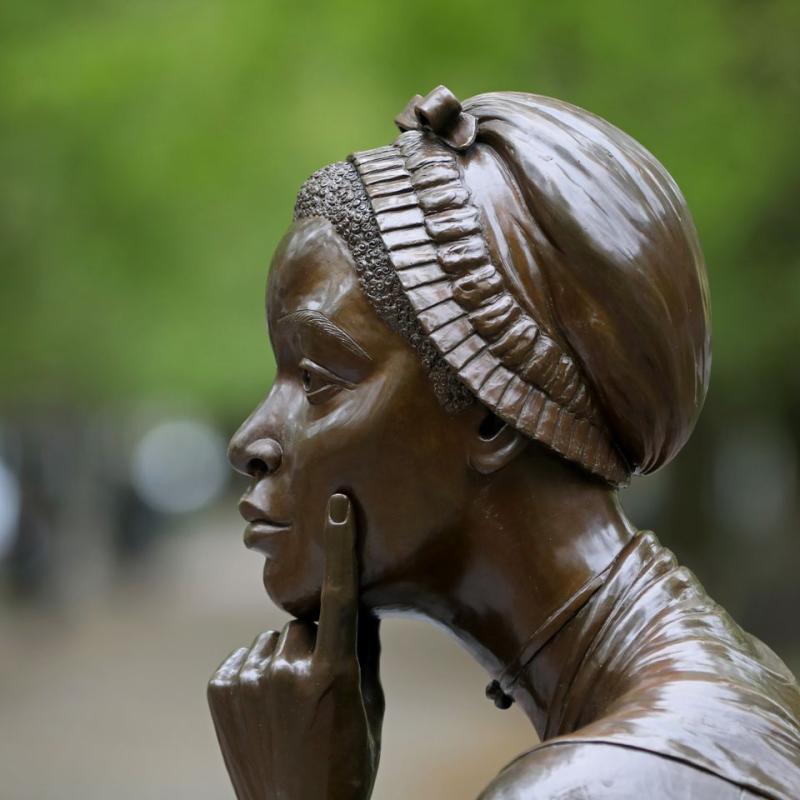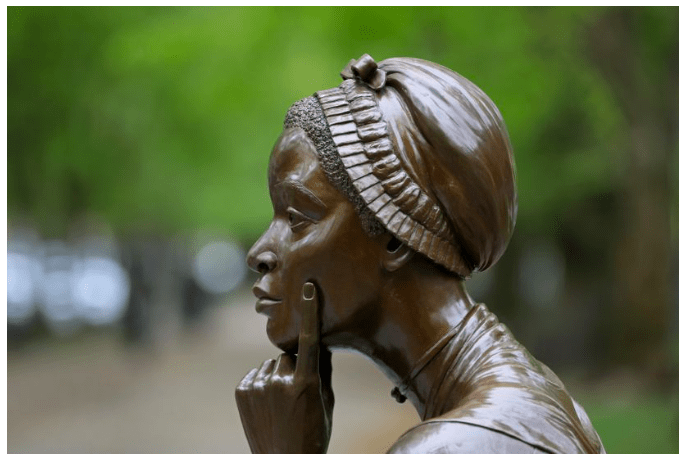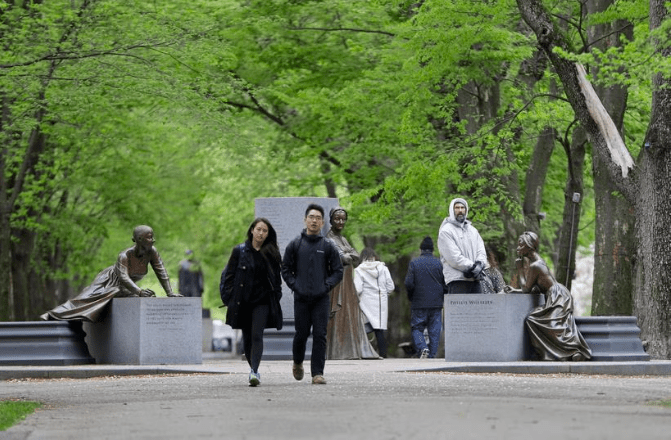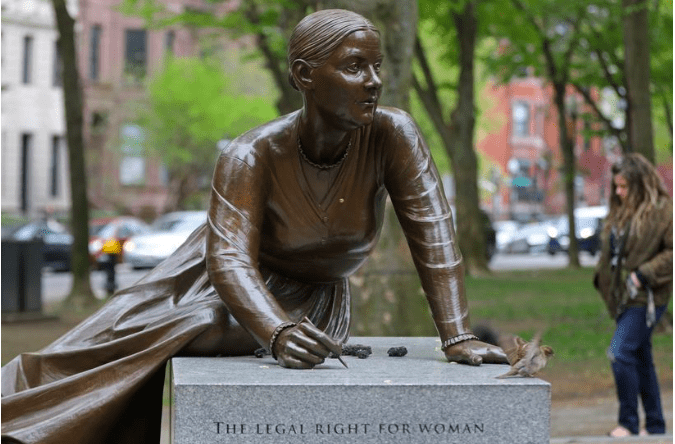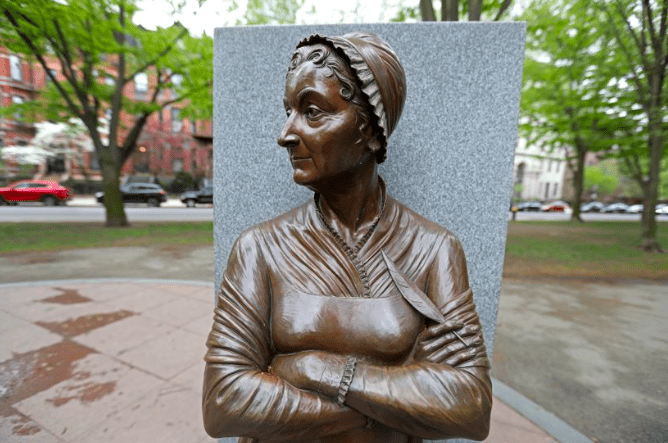Editor's note: the following story originally appeared in The Boston Globe, written by A.Z. Madonna.
Aligning with the memorial’s 20th anniversary, ‘Three Women’ features three new commissioned pieces inspired by first lady and political adviser Abigail Adams, poet Phillis Wheatley, and suffragist and abolitionist Lucy Stone.
Since 2003, the Boston Women’s Memorial has stood on the Commonwealth Avenue Mall, on the block between Fairfield Street and Gloucester Street. Designed by New York-based artist Meredith Bergmann, the monument includes a trio of bronze sculptures featuring three important literary Bostonian women of the 18th and 19th centuries: United States first lady and political adviser Abigail Adams, poet Phillis Wheatley, and suffragist and abolitionist Lucy Stone.
Choral conductor and scholar Amelia LeClair has lived in the Boston area for more than twice the time that the Women’s Memorial has existed, and she has spent much of that time unearthing, studying, and performing music by underappreciated women composers of the past. Still, she said in a recent phone interview, she had never consciously noticed the Women’s Memorial until relatively recently. Susan Wilson, a public historian whom LeClair met and befriended while doing research at the Women’s Studies Research Center at Brandeis University, brought it to her attention.
The Boston Women’s Memorial is located on the Commonwealth Avenue Mall, between Fairfield and Gloucester streets. One of the statues depicts Phillis Wheatley. A concert will celebrate the 20th anniversary of the memorial.PAT GREENHOUSE/GLOBE STAFF
The Boston Women’s Memorial is located on the Commonwealth Avenue Mall, between Fairfield and Gloucester streets. Statues depict (from left) Lucy Stone, Abigail Adams, and Phillis Wheatley. A concert will celebrate the 20th anniversary of the memorial. PAT GREENHOUSE/GLOBE STAFF
“I didn’t know about it, and it’s amazed me how many people didn’t know about it! Right after I saw it, I went around asking everybody, ‘Have you seen this?’ Because I thought I must be an idiot,” LeClair said. “And so many people said, ‘What? I’ve never heard of that.’”
Because LeClair is both founder and artistic director of Cappella Clausura, a Newton-based professional ensemble of vocalists and instrumentalists, she decided to celebrate the memorial with a concert. The final concert of Clausura’s 2022-23 season this Sunday, titled “Three Women,” will honor the memorial with three new commissioned pieces inspired by Adams, Wheatley, and Stone. The goal is to help people learn about the memorial and why these women are important to the history of Boston, she said. “I’m hoping music will help them broadcast who they are.”
One of the three statues of the Boston Women’s Memorial on the Commonwealth Avenue Mall depicts Lucy Stone. PAT GREENHOUSE/GLOBE STAFF
For the concert, LeClair commissioned three women with Boston ties: Inés Velasco, Melika M. Fitzhugh, and Emily Lau. Each composed a piece for the ensemble including writing by a woman honored in the memorial. Velasco, a jazz composer and arranger who graduated from Berklee College of Music, used the quotations from Adams’s writings that are engraved on her pedestal in the memorial to create “Remember the Ladies,” a piece for four unaccompanied voices. Fitzhugh’s “Imagination - Fancy” honors Wheatley in quasi-medieval style, as upper and lower voices simultaneously sing different stanzas from Wheatley’s poem “On Imagination.” In “Hi, I am Lucy Stone,” Lau weaves direct quotes from Stone’s writing with her own personal commentary.
The fact that the concert coincides with the memorial’s 20th anniversary was at first simply a happy coincidence, LeClair said, but it has ultimately grown into a celebration on a larger scale than she expected. In addition to Wilson and Bergmann, the program was organized in collaboration with historical organizations Suffrage100MA and the Boston Women’s Heritage Trail. Several people who were involved in the initial commissioning of the memorial will be present at the concert, LeClair said. State Senator Lydia Edwards is planning to be present, and US Senator Elizabeth Warren recorded a video message for the occasion.
Boston is home to many public portrait statues, but most of these are “white men on pedestals,” said Wilson, who is also the official house historian for the Omni Parker House hotel. “What does this mean to kids or passersby? ’There’s a person I should look up to. I should look up to Ben Franklin on School Street, I should look up to George Washington on his horse in the Public Garden.’”
Another statue of the Boston Women’s Memorial on the Commonwealth Avenue Mall depicts Abigail Adams. PAT GREENHOUSE/GLOBE STAFF
By contrast, the figures in the Women’s Memorial aren’t standing on their granite pedestals, but using them as writing surfaces or leaning on them. Because the statues are at ground level, people can actually interact with and touch the statues as well as read the inscriptions on the pedestals, Wilson said. “To see a little kid grab Phillis Wheatley’s hand, ‘I can be this person,’ you know. ‘I can change the world, like they did.’ I think it’s a much more modern concept of heroes.’”
“You can really look at their faces and be with them,” said LeClair. “I love the fact that they’re using the granite pedestals to work … Abigail looks like she’s mid-sentence and scolding John about something. It’s great.”
CAPPELLA CLAUSURA
At Emmanuel Church, May 7 at 4 p.m. Free; tickets required. www.clausura.org
________________
A.Z. Madonna can be reached at az.madonna@globe.com. Follow her @knitandlisten.
